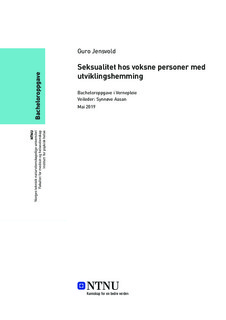| dc.contributor.advisor | Aasan, Synnøve. | |
| dc.contributor.author | Jensvold, Guro. | |
| dc.date.accessioned | 2019-08-24T14:02:26Z | |
| dc.date.available | 2019-08-24T14:02:26Z | |
| dc.date.issued | 2019 | |
| dc.identifier.uri | http://hdl.handle.net/11250/2610635 | |
| dc.description.abstract | Bakgrunn: Personer med en utviklingshemming viser seg å ha de samme seksuelle behovene som den øvrige befolkningen. Til tross for dette, viser forskning til at personer med utviklingshemming har lite kunnskap rundt temaet seksualitet, mangelfull seksualopplæring og er i større risiko for å bli utsatt for seksuelle overgrep. Økt kunnskap og endring av holdninger rundt temaet seksualitet hos tjenesteytere er nødvendig for å kunne forebygge eventuelle seksuelle overgrep og bidra til å skape en sunn, seksuell helse hos personer med en utviklingshemming.
Hensikt: Hensikten med studien er å finne ulike utfordringer som kan oppstå hos voksne personer med en utviklingshemming i forhold til temaet seksualitet, og hvordan ansatte kan bidra til å skape et seksualvennlig miljø for personer med en utviklingshemming.
Metode: Studien er en kvalitativ litteraturstudie. Det er anvendt teoretisk faglitteratur rundt temaet seksualitet og utviklingshemming, og fem vitenskapelige forskningsartikler ble utvalgt etter å ha gjennomført et systematisk litteratursøk.
Resultat: Forskningen viste til at seksualitet er et tabubelagt og vanskelig samtaleemne hos de ansatte. Det vises også til mangelfull seksualundervisning/opplæring hos både tjenesteytere- og mottakere. De grunnleggende, sosioseksuelle kunnskapene hos tjenestemottakerne var generelt svake, med tanke på at flere av de var seksuelt aktive og i intime forhold.
Konklusjon: For å summere opp, viser forskningen at det er behov for økt seksualopplæring hos både tjenestemottakere- og ytere. Flere av studiene viser til at personer med utviklingshemming er seksuelt aktive og på søken etter en partner. Det rettes også fokus mot holdninger tjenesteyterne har til temaet seksualitet, og at det fortsatt den dag i dag er et skyggelagt samtaleemne. Tjenesteyterne burde rette oppmerksomheten rundt temaet seksualitet, og sette det på dagsorden. Dette for å kunne bidra til å skape et seksualvennlig miljø hos personer med utviklingshemming, og forebygge eventuelle seksuelle overgrep. | |
| dc.description.abstract | Background: People with intellectual disabilities turn out to have the same sexual needs as the rest of the population. Research indicates that people with intellectual disabilities have the same sexual needs as the rest, and lack sexual education. They are also at greater risk of being subjected to sexual abuse than the rest of the population. Increased knowledge and an attitude change around the topic of sexuality among service providers is necessary to prevent any sexual abuse, and to help create a sexual health in people with intellectual disabilities.
Purpose: The purpose of the study is to find various challenges that can arise in adults with intellectual disabilities in relation to the topic of sexuality, and to investigate how employees can help to create a healthy environment for sexuality for this group of people.
Method: The study is a qualitative literature study. Theoretical literature on the subject of sexuality and intellectual disability has been used, and five scientific research articles were selected after having conducted a systematic literature search.
Result: The research showed that sexuality is a socially sensitive topic for the employees. There is also a lack of sexual education for both service providers and recipients. The basic socio-sexual knowledge of the service recipients was generally poor, considering that many of them were sexually active and in intimate relationships.
Conclusion: To sum up, the research shows that there is a need for increased sexual education among both service recipients and providers. Several studies indicate that people with intellectual disabilities are sexually active and seeking a partner. The attitudes of providers also matter, although the topic is still socially sensitive. To help create a natural sexual environment for people with mental disabilities and to prevent sexual abuse, an emphasis on sexual education and change in attitudes is necessary for the providers. | |
| dc.language | nob | |
| dc.publisher | NTNU | |
| dc.title | Seksualitet hos voksne personer med utviklingshemming | |
| dc.type | Bachelor thesis | |
